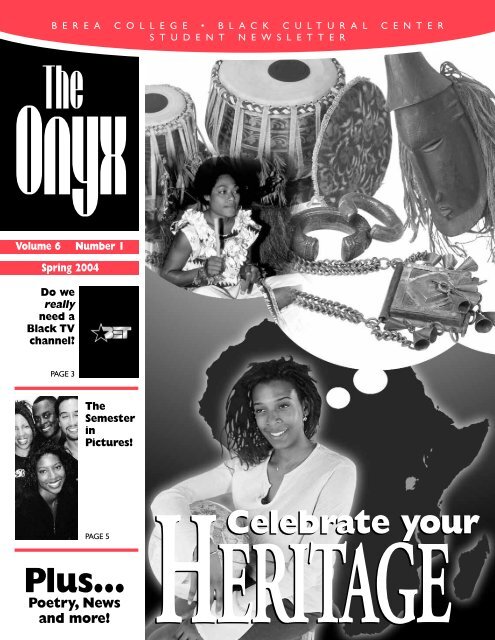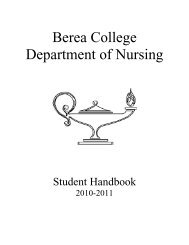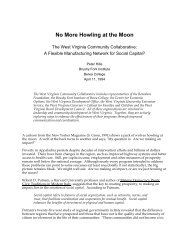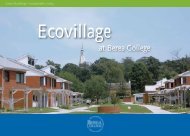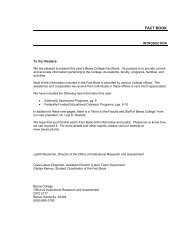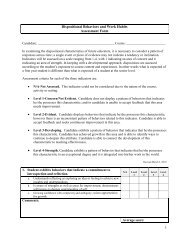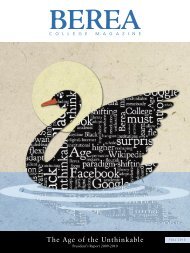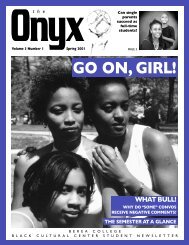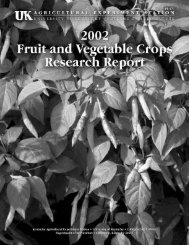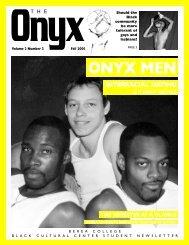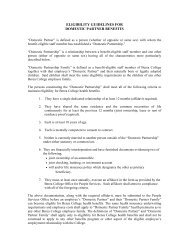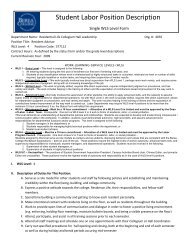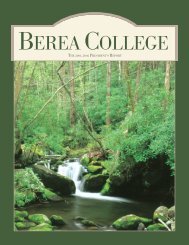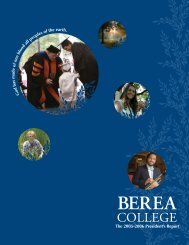Spring 2004 Issue - Berea College
Spring 2004 Issue - Berea College
Spring 2004 Issue - Berea College
You also want an ePaper? Increase the reach of your titles
YUMPU automatically turns print PDFs into web optimized ePapers that Google loves.
B E R E A C O L L E G E • B L A C K C U L T U R A L C E N T E R<br />
S T U D E N T N E W S L E T T E R<br />
✽▲■<br />
✸❘❪❭<br />
Volume 6 Number 1<br />
<strong>Spring</strong> <strong>2004</strong><br />
Do we<br />
really<br />
need a<br />
Black TV<br />
channel?<br />
PAGE 3<br />
The<br />
Semester<br />
in<br />
Pictures!<br />
PAGE 5<br />
Plus…<br />
Poetry, News<br />
and more!<br />
Celebrate your<br />
HERITAGE
2<br />
T H E O N Y X S P R I N G 2 0 0 4<br />
✽▲■<br />
✸❘❪❭<br />
Volume 6 Number 1<br />
<strong>Spring</strong> <strong>2004</strong><br />
EDITOR’S<br />
✬✸✶✶✮✷✽<br />
Explore your roots!<br />
The <strong>Spring</strong> <strong>2004</strong> Onyx is dedicated to all persons of African descent.<br />
Celebrate your heritage! Learn, grow and support each other—that’s the<br />
only way we can be successful in this world. Never give up!<br />
DANIELLE SAUNDERS, Editor<br />
A Student Publication of the<br />
Black Cultural Center<br />
<strong>Berea</strong> <strong>College</strong><br />
CPO 2127, <strong>Berea</strong>, KY 40404<br />
www.berea.edu/bcc/website/<br />
(859) 985-3797<br />
(859) 985-3913<br />
FAX<br />
Paula McGhee<br />
Editor-in-Chief<br />
Danielle Saunders<br />
Editor<br />
Gyude Moore, Markias Littlejohn,<br />
Chris Hayes, La’Quita Middleton,<br />
La’Tara Clayton, Adowa Nyamekye,<br />
Kisha Arthur, Jonathan Johnson,<br />
Sharonda Griffin<br />
Contributing Writers<br />
POET’S<br />
✬✸✻✷✮✻<br />
You embraced my hand<br />
taking it into your palm like<br />
a bandage you rubbed it upon<br />
you like a cloak that could<br />
protect you from all harm<br />
the world could threaten to create<br />
and in that second I existed<br />
like a light I danced<br />
and leaped<br />
unseen and unconceivable<br />
not captive or captivated by<br />
any force this life could offer me<br />
for a suspended gasp<br />
I<br />
lay in you and you in I<br />
together we were one<br />
untold and undone<br />
by no one.<br />
KISHA ARTHUR
3<br />
T H E O N Y X S P R I N G 2 0 0 4<br />
STAFF<br />
✻✮✯✵✮✬✽✲✸✷<br />
African or American?<br />
An Exploration of Identity<br />
By JONATHAN L. JOHNSON<br />
“Herein lie buried many things which if read with patience may show the strange<br />
meaning of being black here at the dawn of the Twentieth Century.”<br />
See<br />
related<br />
article<br />
on<br />
Page 6<br />
Dr. William Edward Burghardt Du Bois published these words in<br />
Souls of Black Folk in 1903 to address what he considered to be the<br />
problems of his emerging era as “the color line” in American society.<br />
Resulting from this crisis, African Americans were bound to conceal<br />
who they were in the midst of who society presumed them to be.<br />
Here, Du Bois describes the passionate conflict of the “doubleconsciousness”<br />
between that of Negro and American thought,<br />
perception and identity. Du Bois’ essays in the Souls of Black<br />
Folk were not an attempt to define the African American, but to<br />
convey an insular meaning of what it meant to be Black in<br />
America.<br />
Today, in the twenty-first century, over one hundred years<br />
later, to what would Du Bois attribute the dilemmas of Blacks<br />
in America? Certainly, scholars, poets, the media and social<br />
critics alike have all addressed racism, socioeconomic<br />
status, affirmative action and the state of the Black<br />
family as critical issues in the Black community. Yet,<br />
how is the notion of double-consciousness applicable<br />
to how Blacks in America perceive themselves today?<br />
As a member of this community, this question is<br />
significant, particularly the extent to which African<br />
Americans actually relate to themselves. How are<br />
African Americans distinguished from other<br />
Americans? What is meant by African American identity?<br />
Turn to IDENTITY • p. 12
4<br />
T H E O N Y X S P R I N G 2 0 0 4<br />
NEWS<br />
✫✲✽✮✼<br />
Con-Grad-ulations!<br />
Good luck and congratulations to<br />
our graduating seniors!<br />
Satrice Allen<br />
John Birckhead<br />
Charesa Bradberry<br />
Dena Buress<br />
Christian Caul<br />
Taraia Coleman<br />
Theresa Curtis<br />
LaTonya Davis<br />
Natalie Davis<br />
Tiffany Davis<br />
Jamie Eckford<br />
Shemeka Hamilton<br />
Mehreteab Helebo<br />
Pa Jatta<br />
Eddie Jeffreys<br />
Leah Johnson<br />
Shelda King<br />
Wiseman Koster<br />
Celeste Lee<br />
Katrina Maloney<br />
Reck Mhango<br />
La’Quita Middleton<br />
Reneen Mincy<br />
Kimberley Morrison<br />
Romeatrius Moss<br />
Ruqayyah Murtadha<br />
Eusebia Mwasaru<br />
Ann Ndei<br />
Adowa Nyamekye<br />
Joseph Owusu-Ansah<br />
Charity Pickens<br />
Trnaye Pierson<br />
Toccara Porter<br />
Kumba Semega-Janneh<br />
Shaquita Smith<br />
Felicia Sullivan<br />
Angel Todd<br />
Al Toe<br />
Willandra Wallace<br />
George Webb<br />
Frances Williams<br />
Niyetta Williams<br />
POET’S<br />
✬✸✻✷✮✻<br />
First-Born of Royalty<br />
Dedicated to Little Miss Niara Selah<br />
A strong, steadfast woman of high purpose.<br />
Who shall this woman be?<br />
Another Harriet Tubman<br />
Who’ll free her enslaved people<br />
Not mindful of the hefty bounty on her head?<br />
Shall she be a female version of Malcolm X<br />
Who’ll give her life to changing the mentality<br />
Of her people and making them rise above<br />
The status the White man said?<br />
Or, shall she be a Nat Turner<br />
Who sacrificed his life by ultimately<br />
obeying the<br />
Holy Will of God?<br />
What about God’s servant, Moses?<br />
Will she, too, lead her people<br />
To the Promised land<br />
With Faith and the raising of her rod?<br />
First born of Royalty<br />
The Daughter of the King<br />
What kind of voice will this Sista have<br />
When she opens her mouth to sing?<br />
Will she be Awake<br />
Or will she be a dreamer?<br />
I pray she’ll be Awake because<br />
Dreamers only dream.<br />
First born of Royalty<br />
The Daughter of the King<br />
I pray she changes this old world<br />
With the message that she sends.<br />
LA’ QUITA MIDDLETON
5<br />
T H E O N Y X S P R I N G 2 0 0 4<br />
H<br />
A<br />
G<br />
A-C<br />
D-E<br />
Ghana Short<br />
Term<br />
Step Afrika<br />
Convo<br />
B<br />
F-H<br />
Unity<br />
Banquet<br />
C<br />
F<br />
D<br />
E
6<br />
T H E O N Y X S P R I N G 2 0 0 4<br />
Feed the<br />
DREAM<br />
Learn to<br />
embrace<br />
your<br />
African<br />
heritage<br />
By SHARONDA GRIFFIN<br />
This semester included two very important celebrations of<br />
African American culture and history. On January 19th the<br />
<strong>Berea</strong> Community came together to celebrate the birth and life<br />
of civil rights leader Dr. Martin Luther King, Jr. On February<br />
21st various offices across campus joined<br />
COVER together to sponsor the annual Unity<br />
✼✽✸✻❂<br />
Banquet, which is a part of a weekend<br />
celebrating Dr. Carter G. Woodson, his<br />
legacy, and the contributions he made to<br />
<strong>Berea</strong> <strong>College</strong> and the study of African<br />
people throughout the Diaspora. Both<br />
events provided an opportunity for celebrations and also for<br />
gaining information about the importance of African peoples<br />
to the international community.<br />
The activities for the King Day celebration developed<br />
around the planning of members of the Department of<br />
Religion, Campus Ministries, Student Life, Black Studies,<br />
Residence Life, Seabury Center, Convocation Committee,<br />
History Department, Hutchins Library, <strong>Berea</strong> Baptist Church,<br />
and Union Church. Throughout the day, community<br />
members could celebrate the legacy of Dr. King at a fellowship<br />
breakfast, a video presentation, a chapel service, a march to<br />
city hall, various programs presented by the Child<br />
Developme<br />
afternoon c<br />
and a candl<br />
reception.<br />
the Unity B<br />
a night of c<br />
together for<br />
community<br />
faculty, staf<br />
and prospec<br />
Carter G. W<br />
<strong>College</strong> and<br />
At the M<br />
challenged<br />
callings. At<br />
artist and m<br />
everything b<br />
how it relat<br />
true educat<br />
you know a<br />
truthfully a<br />
With th<br />
has to offer<br />
We demons
7<br />
T H E O N Y X S P R I N G 2 0 0 4<br />
“When you know about your heritage, you<br />
are able to embrace it truthfully and<br />
whole-heartedly.”<br />
nt Lab, an<br />
onvocation,<br />
elight<br />
Similarly,<br />
anquet was<br />
oming<br />
members,<br />
, students<br />
tive students coming together to acknowledge<br />
oodson’s legacy and what it means to <strong>Berea</strong><br />
our world.<br />
LK convocation, Professor Nikki Finney<br />
s to search for our vocations and recognize our<br />
the Unity Banquet Alice Lovelace, a spoken word<br />
other of noted actor/activist Hasan Davis, took<br />
ack to Woodson. She talked about Africa and<br />
es to us today. She demonstrated how important a<br />
on is to all of us embracing our heritage. When<br />
bout your heritage you are able to embrace it<br />
nd whole-heartedly.<br />
e banquet we tried to focus on showing what <strong>Berea</strong><br />
to prospective and current community members.<br />
trated a cultural emphasis in our menus, which<br />
focused on African retentions in southern gourmet<br />
cooking and the cultural connections of our student<br />
showcases which covered different talents including<br />
dance, mime, and song which all stem from our<br />
African roots. Even in our collaborative efforts,<br />
we again embraced our African heritage.<br />
While we are in the process of learning about<br />
our heritage and how it relates to our lives as far as<br />
our ancestors, I realize how much I didn’t know as a<br />
child. It is important to expose our children early<br />
on to African history and connections to the<br />
West. This exposure should include children<br />
of all backgrounds. It is important that an<br />
interracial group of children have an<br />
understanding of the opportunities and<br />
advantages that they have that weren’t<br />
available to children of previous generations.<br />
This will help the world, not just <strong>Berea</strong> <strong>College</strong>, gain a better<br />
understanding of the possibilities of interracial education.<br />
As with the MLK theme, Feeding the Dream, which entails<br />
teaching and experience, it is just as important to talk to our<br />
children about our ancestry and the importance that Africans<br />
play in the lives we live today. There are things that we are<br />
only learning as adults, that we can teach our children. My<br />
son knows so much more about his heritage at age four<br />
because of his early exposure and my intentional efforts to<br />
teach him about who he is. This has to be a continuous<br />
process, not only for us, but also for the children.<br />
Remember to “Feed the Dream” and “Embrace Our<br />
African Heritage,” not just on special occasions but<br />
throughout the entire year.<br />
Sharonda Griffin is a Junior Black Studies major at <strong>Berea</strong> <strong>College</strong>.
8<br />
T H E O N Y X S P R I N G 2 0 0 4<br />
NEWS<br />
✫✲✽✮✼<br />
Winners of the <strong>2004</strong><br />
Unity Banquet Awards<br />
Congratulations to the winners of the<br />
annual Unity Banquet awards which<br />
were presented February 21, <strong>2004</strong>.<br />
DISTINGUISHED STUDENTS<br />
Satrice Allen—senior<br />
Chris Awosika— junior<br />
Melanie Harvey—sophomore<br />
Sonia Mbah—freshman<br />
DISTINGUISHED FACULTY<br />
Linda Strong-Leek—Women’s Studies<br />
DISTINGUISHED DEPARTMENT<br />
Printing Services<br />
Terrible IFs<br />
Misery cried alone that evening<br />
And I refused to sit with her on such a beautiful night.<br />
Sweeping along the sidewalk, my thoughts warming me<br />
Or at least numbing the cold that surrounded the twilight<br />
I pushed through the doors of the diner,<br />
Introduced by the sweet chime of the bell attached to the door<br />
The culture of the diner blurring around me<br />
And the loud ambience of forks, knives and spoons muted in the 39th Street eatery<br />
“Good evening, can I take your order?”<br />
“Just a hot chocolate, please”<br />
“Hot Chocolate? Okay.”<br />
POET’S<br />
✬✸✻✷✮✻<br />
She floated over to the cups and almost innately brought me my cup<br />
Just like every Wednesday night.<br />
“Thank you,” was all I said, sipping silently in the cornered booth.<br />
Notable<br />
Quotable<br />
“Accepting your greatness is the<br />
process of discovering it—revealing<br />
it—living it—tapping into it—and<br />
expoliting it. Maximizing all of your<br />
talents and gifts, so that at the time<br />
of your transition, when you leave<br />
the planet, you will have no regrets.<br />
You will have given all that you have<br />
to fulfill your divine purpose.”<br />
—Rev. Paula L. McGee<br />
from her book,<br />
Accepting Your Greatness<br />
Rev. McGee will be the featured<br />
lecturer for <strong>Berea</strong> <strong>College</strong>’s Accent on<br />
Christian Faith.For additional<br />
information, go to paulamcgee.org<br />
I pushed through the doors of the diner,<br />
Tagged by the sweet chime of the bell attached to the door<br />
The culture of the diner blurring behind me<br />
And the loud ambience of forks, knives and spoons muted in the 39th Street eatery<br />
CHRIS “CAP” HAYES<br />
Ocean Waves<br />
The sound of ocean waves<br />
Crashing into rocks and sand<br />
Peaceful to me, but torture for my ancestors<br />
The crash of the waves signifies a change in the tides.<br />
Changing tides brought merchant ships<br />
Ships seeking goods, cargo, people.<br />
The change of the tides brought change and uncertainty.<br />
Far away lands and cruel, cruel conditions<br />
The sound of ocean waves, crashing into rocks and sand<br />
Peaceful? I think not.<br />
ADOWA NYAMEKYE
9<br />
T H E O N Y X S P R I N G 2 0 0 4<br />
Do we really need BET?<br />
By GYUDE MOORE<br />
About a semester or two ago, someone with the nickname, Convoman, on the defunct BC Live website asked,<br />
“What if there were a White history month, a “White Student Union or a White Cultural Center?” And although<br />
some people would not be caught dead making such statements publicly, they do reflect on these things,<br />
sometimes referring to them as ‘reversed racism’. They harbor thoughts like, “What else do Black people want.<br />
Apparently, Black people no longer want equal rights, they want special rights.”<br />
I am not sure that I will be able to adequately respond to those concerns, but feel that it is necessary to share<br />
my reflections on such comments. First, we must continue to remind ourselves that Blacks are a minority with a<br />
history unlike any other minority in this country. Because of that historical difference, its modern implications and<br />
subtle manifestations, they can never be compared to any other minority. Next, being a minority comes with<br />
myriad disadvantages among them including the control of one’s identity by the majority.<br />
Janet Ruscher notes in her book, Prejudiced Communication, that “On a larger scale dominant groups can use<br />
the mass media to protect their social power by portraying outgroups in a stereoptypic fashion. The dominant<br />
group also may give trivial attention to outgroup concerns and issues, or may only discuss outgroup concerns when<br />
they are linked to negative stereotypic qualities.”<br />
In those words, Ruscher captures the necessity for a Black Cultural Center, Black Student Union or even a<br />
Black Entertainment Television channel. The establishment of those institutions is an attempt by a minority<br />
struggling to control its identity and give guidance to its destiny. Blacks live in a cultural structure that decides<br />
their place without consulting them. It is a structure that literally predetermines what their opportunities would be,<br />
how far they would go, and what their greatest achievements would ever be. In a culture that mainly ignores their<br />
concerns unless it is linked to stereotypical qualities, they strive to convince each other that they are more than<br />
what they are portrayed to be.<br />
This writer strongly believes that the ultimate<br />
quest of human existence is the search for meaning.<br />
It is the pursuit of activities and endeavors that give<br />
meaning to one’s life that overarch our time spent<br />
on earth. It is in those activities and that quest that<br />
people feel moored and find identity. When they<br />
no longer control that pursuit and must accept<br />
what is dictated to them as their identity and as<br />
the only meaning their lives would ever have, they<br />
feel the need to resist. By establishing those<br />
institutions that are distinctly Black, they are in a<br />
life-threatening situation to preserve a positive<br />
identity that they can in turn teach to younger<br />
generations and pass on to posterity. Blacks do not<br />
want special rights, they want to be equal—in<br />
opportunity and life chances!<br />
Gyude Moore is a Junior Sociology major at <strong>Berea</strong> <strong>College</strong>.
10<br />
T H E O N Y X S P R I N G 2 0 0 4<br />
It’s “Cool” to serve!<br />
A look at the <strong>2004</strong> Cool Conference<br />
By MARKIAS LITTLEJOHN<br />
This was my first Cool Conference, and it was an<br />
eye opening experience. It was nice to see other<br />
students from various places around the USA with<br />
similar ideas.<br />
I attended “Letting Your Idealism Work for You,” a<br />
forum on Friday afternoon. This forum was very<br />
informative because many people believe that if you<br />
take a non-profit job, it means giving up luxuries and<br />
living from paycheck to paycheck. We learned that<br />
there are jobs in which you can make a comfortable<br />
salary. Also, we discussed that in preparing for these<br />
jobs, you have to ask yourself, “What are my values?”<br />
“What kind of change would I like to be apart of?”<br />
“What do I want to learn?” “What environment do I<br />
want to work in?” and “What do I need?” In asking<br />
yourself these questions you are prepared for the job<br />
interview and have direction.<br />
“Agents of Change,” was the second event that I<br />
attended. This workshop focused on college students<br />
making the “change”. Students should get together and<br />
discuss the community and its needs. Students have to<br />
set reasonable goals to have direction and a way to<br />
measure effectiveness. This workshop really empowered<br />
the student to go out and<br />
make change, because it only<br />
takes one person.<br />
The next workshop I<br />
attended was, “Where is the<br />
love?” Dorms can team<br />
up with the greater<br />
community. This<br />
session influenced me<br />
the most, since I am on<br />
my dorm’s house<br />
council. I learned in<br />
this session that<br />
each student has<br />
ability, and if you assess it and get to know people<br />
within the dorm, you will know your dorms strengths.<br />
After you assess your dorm, you then assess the<br />
community’s needs and resources. Once you have this<br />
figured out, the next step is finding creative ways to keep<br />
students as well as the community involved in the<br />
programs. In making this a joint effort, it is an equal<br />
reciprocity where it is benefiting both parties. In closing<br />
this workshop, we learned that there is money out there<br />
for programs like this, but you have to look for it.<br />
The next event that I attended was “The<br />
Perception and Manifestation of the Lives of African<br />
American Male <strong>College</strong> Students.” In this session<br />
spirituality was the inner self and we learned that using<br />
our inner strength could manifest change in our<br />
community. There are many avenues to bring about<br />
change, and you have to find the one that works for<br />
you. In closing, we were told we have a mandate to<br />
help others understand the inner soul and the strength<br />
they have and use that to bring about change.<br />
This conference has awakened the inner helper in<br />
me and I feel that I have the power to affect the world. I<br />
feel that each person has a place in changing injustices<br />
and changing the world in a positive way. We must<br />
know our strengths and<br />
abilities and tap into the<br />
avenue that is most successful<br />
for us. This trip was really<br />
mind blowing and I would like<br />
to experience this event again<br />
because it really has<br />
touched me. Thanks<br />
for the opportunity.<br />
Markias Littlejohn<br />
is a Junior Nursing<br />
major at <strong>Berea</strong><br />
<strong>College</strong>.
11<br />
T H E O N Y X S P R I N G 2 0 0 4<br />
POET’S<br />
✬✸✻✷✮✻<br />
Revelation<br />
My eyes are open but do I really see<br />
All the things that are right in front of me<br />
When I walk down the street, camera in hand<br />
Do you wonder my intent, do you even understand?<br />
My wonder and amazement at how you live<br />
My shame and pity even my feelings to give<br />
To show my gratitude and help you out<br />
Because I know you need it without a doubt<br />
Not once did I stop to see just how much you look like me<br />
How your smile curves up tight on the right<br />
How your big brown eyes give you sight<br />
Your wonderful dark skin baked just right in the hot sun<br />
The games you play, the way you have fun<br />
You are beautiful no matter what you don’t have<br />
My big house, fancy cars, and enormous bank account. What do I really have?<br />
As I look into your life and the struggles you go through<br />
The people in your life and how they treat you<br />
Your foreign tongue, the way you shout<br />
Your wife, your children, and how they scurry about<br />
To me you are different in many ways<br />
Even though I don’t see how you live your days<br />
Four hundred years ago I was stolen from you<br />
Oh how sad because there was nothing you could do<br />
So here I am back in the swing of things<br />
Full of love and joy and all that they bring<br />
Mother Africa I am here with my arms held out<br />
Not to help but just to shout<br />
Way up to those heavens where our God lives<br />
One who loves, one who gives<br />
I am me, and that is all I can be<br />
Though you may think so, I am not wealthy<br />
In America I am a young African American woman who loves God and all He stands for<br />
And to me your life is a total bore<br />
So as I stand here with my arms stretched to my Lord<br />
I pray that He sends down to you all things He has stored<br />
Keep us all, from the U.S. to China, in love and peace as we encounter<br />
Each other’s cultures and ways of life, so all of our living will not be in strife<br />
My prayer is that you love us all very dearly<br />
And your purpose for us you show very clearly<br />
LA’TARA CLAYTON<br />
THE<br />
❀✸✻✭<br />
Question: If you could travel<br />
to any country in Africa (or of<br />
predominantly African descent),<br />
which would it be and why?<br />
“South Africa, because you<br />
receive the best of both<br />
worlds.”<br />
Tony Sutton<br />
Sophomore<br />
Child and Family Studies<br />
“South Africa, because a<br />
lot of racial struggles are<br />
similr to those of the past<br />
in the U.S.”<br />
Leonard Fields<br />
Sophomore<br />
Communication<br />
“I would travel to Haiti. I<br />
am interested in the<br />
dynamics between<br />
voodoo and Christianity.”<br />
Sarah Poole<br />
Junior<br />
English<br />
“I desire to do mission<br />
work in Africa, I would<br />
take a trip to any part of<br />
Africa.”<br />
Ebony Walker<br />
Freshman<br />
Nursing
MISSION<br />
✼✽✪✽✮✶✮✷✽<br />
The Black Cultural Center first opened its doors in July<br />
1983.The Center was established and based on the premise<br />
that true integration and equality cannot be achieved without<br />
a general awareness and understanding of black culture.The<br />
Black Cultural Center provides programs and services that<br />
foster cross-cultural exchanges and intentional social<br />
intercourse.<br />
The mission of the Black Cultural Center is to:<br />
• assist <strong>Berea</strong> <strong>College</strong> in maintaining an environment that<br />
acknowledges, respects, and enhances diversity and<br />
promotes multicultural educational opportunities;<br />
• assist the <strong>College</strong> in its effort to recruit, retain, and<br />
graduate students of color;<br />
• assist students of color in developing a greater<br />
understanding of his/her own culture and heritage<br />
• provide support services, programs, and activities that<br />
promote the intellectual, career, social, moral, and<br />
personal development of students of color and assist<br />
them in achieving their highest educational potential; and<br />
• assist <strong>Berea</strong> <strong>College</strong> in recruiting and retaining faculty of<br />
color.<br />
ANCESTOR<br />
✱✲✰✱✵✲✰✱✽<br />
Chinua Achebe<br />
Achebe is a writer, teacher, editor and diplomat.<br />
He published his first novel Things Fall Apart, two<br />
years before the British left Nigeria.This novel is a<br />
landmark: it is printed in 40 different<br />
languages and has sold millions of<br />
copies across the world.After college<br />
and teaching for a year,Achebe spent<br />
twelve years as a television producer.<br />
He discovered that almost all books<br />
about blacks were written by white<br />
Achebe<br />
people and that encouraged him to write. He felt<br />
that no white man could get under the skin of a<br />
black man like a black man. Chinua Achebe was<br />
offered the presidency of his home country of<br />
Nigeria, but refused. His works are unbelievable<br />
in insight of language and place has had a great<br />
impact on many.<br />
—AAWC<br />
Identity<br />
Continued from p. 2<br />
When confronted with such questions, there are those who<br />
have a difficult time describing the African component of their<br />
identity. The American component has been much easier to<br />
characterize because of the lifestyle, history and culture<br />
assimilated over the years from mainstream society.<br />
Unfortunately, there is a loss of consciousness within the<br />
Black community in America, for much less is known about<br />
being African than American. How does Black America then<br />
recover from this loss? During the Short-term of <strong>2004</strong>, I was<br />
blessed with an opportunity to travel to Ghana, West Africa<br />
with a class entitled Reclaiming Wisdom through Music, Religion<br />
and Philosophy, where I served as an administrator. As the title<br />
of the class implies, we all had a unique opportunity to discover<br />
a portion of African music, religion and way of life through<br />
dialogues, readings and experiential learning. Among the<br />
people, I felt the intense pride of their birthrights; listening to<br />
the rhythm of the drums, I heard the legacy of their forefathers;<br />
and at the shores of the slave dungeons, I experienced an<br />
awakening in the cradle of my heritage. It was there that I<br />
realized more than ever who I am. It was there that I<br />
confirmed my self-awareness as an African American.<br />
Through the middle passage to slavery, Africa is a part of all<br />
Americans’ history and should be integrated into each of our<br />
lives, particularly those of African descent. The encounters I<br />
had in Ghana was nothing short of a profound spiritual,<br />
cultural and African connection filled with honored tradition<br />
and proud heritage. What was lost, found; what was once<br />
removed, now reclaimed.<br />
Jonathan L. Johnson is a member of the Residential Life Collegium<br />
at <strong>Berea</strong> <strong>College</strong>.


